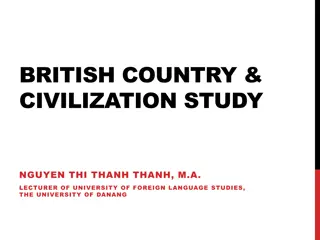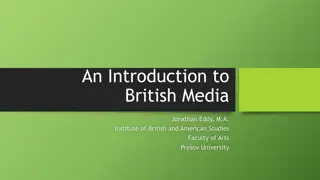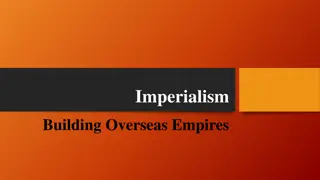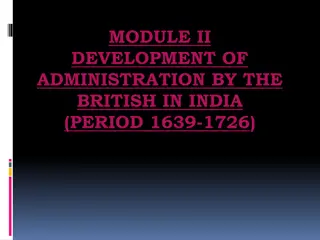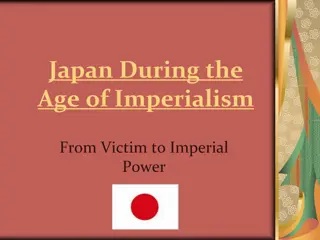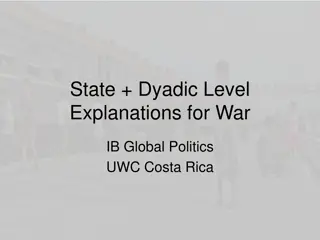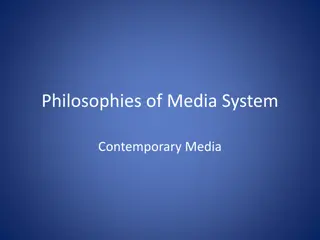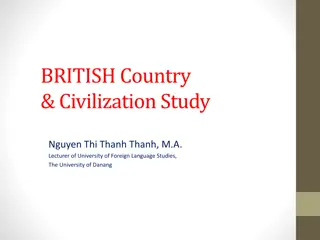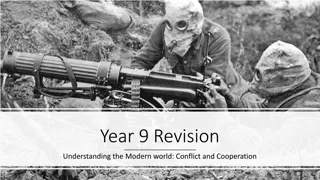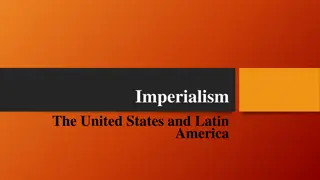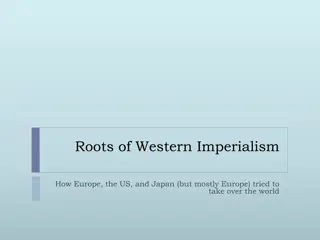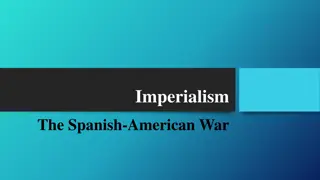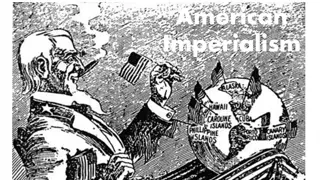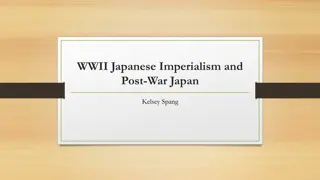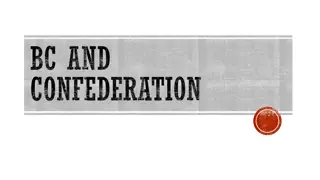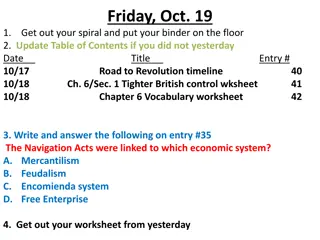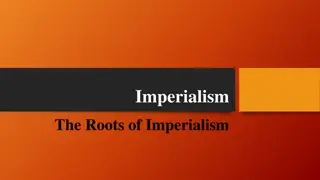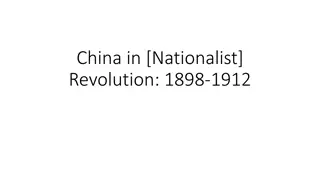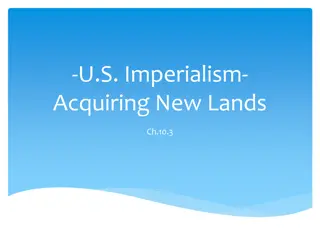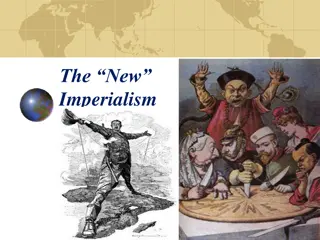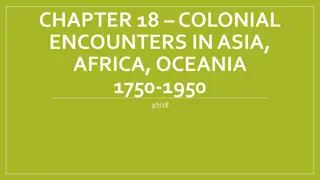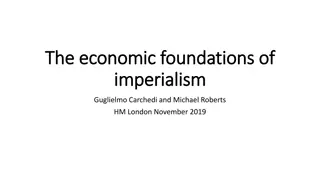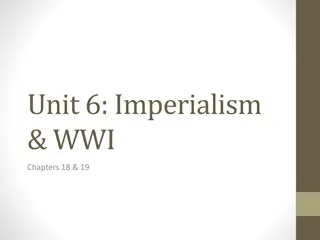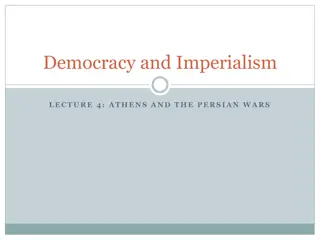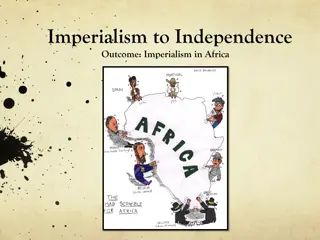Buy Counterfeit British Pounds Online - @Eurosbillsnotes
Buy top-quality undetectable Buy Counterfeit British Pounds Online to cover most of your expenses. Get fake British bills to cover most of your expenses. The United Kingdom is one of the most expensive countries in the world, with a high standard of living that comes at a cost. With rising property
2 views • 1 slides
Understanding British Culture and Civilization: Insights from Nguyen Thi Thanh
Explore the nuances of British identity, language, and multiculturalism through the expertise of Nguyen Thi Thanh, a lecturer at the University of Danang. Discover the distinctions between Great Britain, the United Kingdom, and the British Isles, as well as the linguistic diversity and immigration h
1 views • 14 slides
An Introduction to British Media: Overview of Print and Digital Platforms
This content provides an insightful overview of the British media landscape, focusing on newspapers, television, radio, and social media. It discusses the distinctions between tabloids and broadsheets, highlighting the influence of British media on social and political views. Key characteristics of
1 views • 43 slides
European Imperialism in the Late 19th Century
European nations in the late 1800s pursued imperialism to expand their empires for economic, political, and social reasons. Motives included economic interests, political and military ambitions, and the ideology of Social Darwinism. The Industrial Revolution fueled the need for resources and markets
1 views • 14 slides
British Administration in India: 1639-1726 Development
Development of British administration in India from 1639 to 1726 under the British East India Company, including the formation, charter, legislative powers, judicial system, and establishment of trading centers like Surat. The administration of justice and court developments during this period are h
0 views • 22 slides
Development of Indian Penal Code (IPC) 1860 and Its Impact in British India
The Indian Penal Code (IPC) of 1860 was introduced in British India after a series of historical events led to the need for a comprehensive criminal justice system. The disintegration of the Mughal Empire paved the way for British takeover, resulting in variations in criminal laws across different B
1 views • 24 slides
Japan's Transformation During the Age of Imperialism
Japan's journey during the Age of Imperialism saw it transition from isolationism to becoming an imperial power. From strict order under the Tokugawa shoguns to the Meiji Era's rapid modernization, Japan adopted Western influences to reform and militarize. The Treaty of Kanagawa in 1854 marked the e
1 views • 20 slides
Exploration of Colonial Discourse in George Orwell's "Shooting an Elephant
George Orwell's "Shooting an Elephant" delves into the psychological conflict of a police officer upholding British imperial rule in Burma. The narrative unravels Orwell's ambivalence towards colonialism, his struggles with authority and identity, and the complexities of power dynamics and moral res
5 views • 17 slides
Examining State-Level and Dyadic Explanations for War in Global Politics
Understanding the reasons why certain states are more war-prone than others involves exploring factors such as economy, internal opposition, and political systems. Marxist explanations argue that capitalist economies are more prone to war due to issues like overproduction, wealth inequality, and imp
0 views • 17 slides
Carnatic Wars in the 18th Century: Conflict between Indian and British East India Companies
Carnatic Wars were a series of military conflicts in the mid-18th century between the Indian Company, British East India Company, and various independent rulers. Total of three wars were fought - First Carnatic War (1746-48), Second Carnatic War (1749-1754), and Third Carnatic War (1757-1763). The w
1 views • 12 slides
Understanding Media Imperialism and Cultural Influence
Explore the concepts of cultural imperialism, media imperialism, and theories of communication in contemporary media systems. Cultural imperialism involves the influence of powerful cultures on less dominant ones, impacting cultural identity. Media imperialism refers to the one-way flow of informati
0 views • 12 slides
British Holiday Traditions and Bank Holidays Overview
Exploring British holiday traditions, vacations, and bank holidays, this study covers the significance of holidays in the UK, including vacation patterns, paid leaves, and common travel destinations. It delves into the differences between holidays in British English and American English, highlightin
1 views • 29 slides
History of Australia: From British Convicts to Independence
The passage outlines Australia's history from the arrival of British convicts in 1788 to the establishment of an independent nation by 1901. It highlights the conflicts, societal developments, and impact of imperialism on the Indigenous populations. The text also discusses the formation of an Austra
1 views • 13 slides
Understanding Colonialism and Imperialism in Modern History
The discussion revolves around the impact of colonialism and imperialism on international relations, focusing on the historical context, economic consequences, and nationalist movements against colonial powers. Highlighting key players such as Great Britain, France, and Germany during the 19th centu
2 views • 14 slides
Understanding the Modern World: Conflict and Cooperation in Year 9 Revision
This revision material covers various aspects of conflicts and cooperation in the modern world, focusing on World War I and World War II. It discusses the causes of both wars, life changes during the wars, the rise of totalitarian governments, the Holocaust, British involvement in WWI, trench warfar
0 views • 10 slides
Orientalism and Imaginative Imperialism in the Arabian Nights
This content discusses the intertwining of Orientalism, imperialism, and literature in works like "A Thousand and One Nights" (The Arabian Nights). It explores how intellectual and cultural energies influenced the imperialist perspective and translation of these texts, revealing deeper insights into
0 views • 8 slides
United States Imperialism in Latin America
United States' involvement in Latin America, particularly in Puerto Rico and Cuba, post-Spanish-American War, showcased a shift towards imperialism. Policies such as the Foraker Act and the Platt Amendment highlighted American efforts to exert influence in the region, leading to mixed reactions from
0 views • 25 slides
Unveiling the Roots of Western Imperialism: Europe's Quest for Global Domination
Exploring the origins and impacts of Western imperialism by examining how Europe, alongside the US and Japan, sought to exert control over various regions, particularly focusing on Africa. The process of colonization, the motivations behind imperialism, and the consequences for the colonized nations
0 views • 13 slides
Impact of British Empire and Commonwealth on Migration: Unpacking Immigration Stories
Explore the historical impact of the British Empire and Commonwealth on British migration through six immigration stories. Understand how relations with former colonies have shaped diversity in Britain and influenced British immigration patterns. Key terms like migration, emigration, empire, and col
0 views • 23 slides
Joseph Conrad: A Brief Biography and Exploration of Themes in "Heart of Darkness
Joseph Conrad, a Polish-British writer, led a fascinating life as a merchant mariner before becoming a renowned author. His notable works include "Heart of Darkness," a novel exploring the complexities of imperialism and the human condition. Through Conrad's experiences and writings, profound ideas
0 views • 23 slides
Complexity and Critique in Joseph Conrad's Works
Joseph Conrad, born in Poland in 1857, was a British writer known for his critical portrayal of imperialism. His major works like "Heart of Darkness" and "Lord Jim" explore themes of societal collapse, individual crisis, and complexity of experience. Conrad's writing challenges the Victorian narrati
0 views • 6 slides
American Imperialism in the Late 19th Century
Perception of manifest destiny, economic motives, and racial theories drove American expansionism in the 1890s, leading to overseas markets, acquisitions after the Spanish-American War, and debates over imperialism. Key figures, events, and ideologies shaped America's rise as a global power, includi
0 views • 13 slides
Unit Assessment Review: U.S. Imperialism History Lesson
Review session for upcoming history unit assessment on U.S. Imperialism. Topics covered include key events such as the Philippines under American control, reasons for Mark Twain's anti-Imperialist stance, factors driving American foreign policy towards imperialism, the case of Hawaii's Queen Liliuok
0 views • 15 slides
Causes of the Spanish-American War: Imperialism, Cuba, and Yellow Journalism
The Spanish-American War was fueled by imperialism, particularly the desire for colonies, as well as the unrest in Cuba against Spanish rule. American economic interests in Cuba, coupled with yellow journalism's sensationalized reporting, further escalated tensions leading to the conflict.
0 views • 25 slides
Exploration of American Imperialism Through Historical Events
American imperialism, characterized by extending control over weaker regions for economic and political gain, is exemplified through events like Hawaii's annexation and China's Open Door Policy. The impacts of imperialism on native populations, such as Hawaiians and the Chinese, raise questions abou
0 views • 13 slides
Democracy and Imperialism: Origins and Legacy of Classical Athens
The module explores the origins, nature, and legacy of democracy in Classical Athens (508-322 BC), shedding light on the political structures, principles, and impact of Athenian democracy. Topics range from the supreme authority of the Assembly to the accountability of magistrates, providing insight
0 views • 16 slides
American Imperialism in the Late 19th Century
The late 1880s and 1890s saw the United States embroiled in near-wars and diplomatic crises due to American expansionism. This included the annexation of Hawaii despite Queen Liliuokalani's opposition, and the debate over acquiring the Philippines for economic interests. Anti-imperialists argued aga
0 views • 5 slides
WWII Japanese Imperialism and Post-War Japan
Explore the historical narrative of WWII Japanese imperialism, the factors leading to Japanese control of Pan-Asia, interference from the West, rational for Pearl Harbor, and the aftermath including the fall of Japan and the devastating effects of the atomic bombs on Hiroshima and Nagasaki.
0 views • 17 slides
Challenges and Choices in British Columbia's History
British Columbia faced economic challenges post the Gold Rush, leading to a consolidation of colonies and increasing debt. The united colony explored options of Confederation, maintaining British colonial status, or annexation by the US, driven by different groups with varied interests. This histori
0 views • 10 slides
Impacts of British Rule in India
Explore the historical journey of British colonialism in India through key events such as the expansion of the East India Company, cultural changes, imposition of British laws, the Sepoy Mutiny, and subsequent protests. Witness the transformation of Indian society and the rise of resistance against
0 views • 17 slides
Colonial Challenges Under British Rule
In this academic material, students are instructed to update the Table of Contents and engage with resources related to tighter British control over the colonies. The tasks include exploring historical events like the Proclamation Act of 1763, Quartering Act, Sugar Act, Stamp Act, Declaratory Act, a
0 views • 18 slides
Understanding the Roots and Causes of Imperialism
The roots of imperialism trace back to the late 19th century when the U.S. transitioned to a major global player, acquiring territories and expanding influence beyond its borders. Economic benefits, such as access to raw materials and gaining a competitive edge, drove nations towards imperialism. Th
0 views • 16 slides
Chinese Nationalist Revolution: Prelude to Internal Tensions and Imperialism Redux
Prelude to the Chinese Nationalist Revolution explores the backdrop of internal tensions and Imperialism in China from 1895 to the early 1900s. The period witnessed a series of revolts against Manchu authority, including the Taiping Rebellion and self-strengthening efforts to adopt Western technolog
0 views • 30 slides
U.S. Imperialism: Acquiring New Lands and Foreign Influence
Explore the impact of U.S. imperialism through the acquisition of territories such as Puerto Rico and Cuba following the Spanish-American War. Discover the control exerted by the U.S. over these regions and how it influenced local governance. Delve into U.S. economic interests in Cuba and foreign in
0 views • 9 slides
The New Imperialism - Historical Overview of European Colonization
Explore the era of the New Imperialism through descriptions of North Africa, Egypt, Belgian Congo, and American missionary accounts. Learn about the impact of imperialism on various territories and the atrocities committed in the pursuit of resources and control.
0 views • 27 slides
Global Interactions and Imperialism in the 18th and 19th Centuries
This content covers colonial encounters in Asia, Africa, and Oceania from 1750 to 1950, focusing on the impact of European imperialism. It delves into the economic, political, and social dynamics of this period, highlighting factors such as linguistic separation, social Darwinism, and the consequenc
0 views • 11 slides
Economic Foundations of Imperialism: Exploitation and Value Transfer
Imperialism primarily functions as an economic mechanism for exploiting value rather than seeking political dominance. The transfer of value occurs through mechanisms like unequal exchange, global value chain flows, and capital flows, leading to the long-term appropriation of value by imperialist na
0 views • 28 slides
United States Foreign Policy Evolution from Imperialism to World War I
Explore the United States' foreign policy evolution from Imperialism to World War I, including the Open Door Policy, Dollar Diplomacy, and involvement in the Spanish-American War. Learn about the military actions in acquiring territories such as Puerto Rico, Guam, Philippines, and Hawaii. Delve into
0 views • 8 slides
The Impact of Athens and the Persian Wars on Democracy and Imperialism
The lecture delves into the historical events surrounding Athens and the Persian Wars, highlighting key milestones such as the expulsion of Hippias with Spartan help, Cleisthenes' reforms, and the rise of Archaic Greek imperialism in Athens and Sparta. Herodotus' perspective on the Persian Wars and
0 views • 21 slides
The Age of Imperialism in Africa: From Imperialism to Independence
The Age of Imperialism in Africa delves into the historical background of European domination, exploring factors such as European motives, societal impact, and the spread of Social Darwinism. It covers the transition from African trade in the 15th to 17th centuries to the eventual independence movem
0 views • 18 slides

